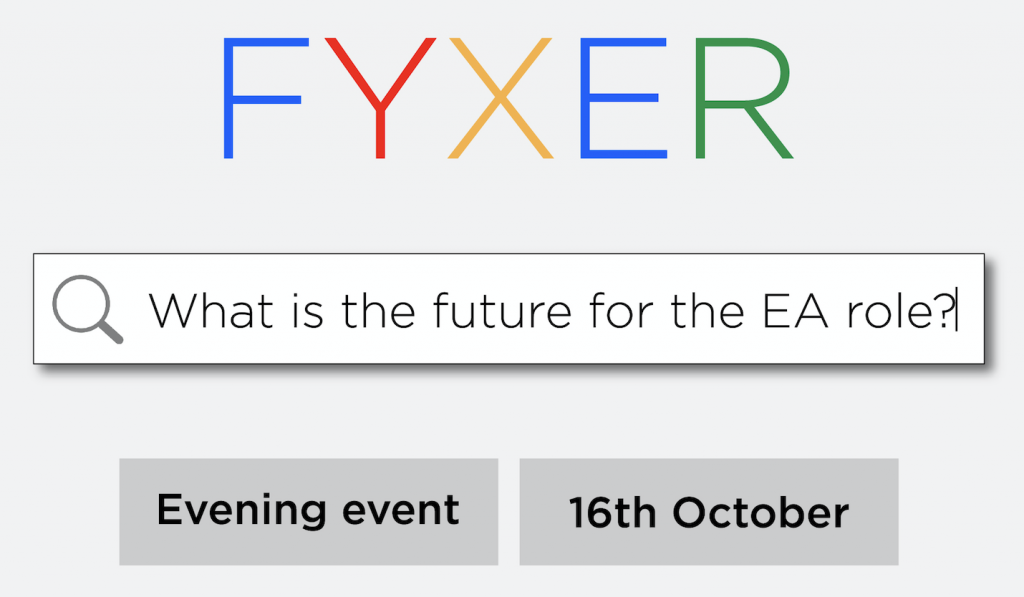On Tuesday evening a group of PAs got together at an event held by Fyxer in central London to discuss a topic that all PAs have worried about recently; what is the future of the EA role, with the advancement of technologies such as artificial intelligence? Vincenzo Ferrara reviews what was discussed.
The event held by Fyxer at the Staples Inn Building’s third-floor room called The Breather Space saw the coming together of around 25 PAs/EAs from around London to discuss the future of the EA role lead by a panel of top EAs.
Jessica Gardiner, High profile EA of 10 years to C-Suites, who is now CEO and founder of The Assistant Room.
Mark McCullum, A varied EA who takes his role on the road, travelling globally whilst supporting a variety of industries and high profile individuals.
Helen Victor, VA at Fyxer and Pod Lead, with a background in Finance.
Alice Howgego, From Channel Four, to Innocent Smoothies, Alice is now a freelance EA, Mentor and Coach.
The semi-formal panel discussion for the evening started off with the question that plagues so many assistant minds at the moment, ‘will bots steal assistant jobs?’
The conversation saw the panel and the audience getting involved in a heated conversational talk. McCullum started with a key statement, telling the room that he believes that human interaction with a boss won’t be replaced by a robot.
This caused the room to discuss what was meant by ‘human interaction’, with one audience member telling a story about how she was told that she would be contacted by ‘Jane’, of course, we thought Jane would be a human. Jane was a new AI piece of technology that could auto-arrange meetings and schedules via emails. The audience member stated ‘I didn’t know I was talking to a robot, the email conversation seemed no different to that I’d had with people before’.
McCullum and Howgego discussed the advantages to humans, when compared to tech in the current climate. The fact that humans have the ability to think laterally and read body language instantly. This means that by approaching a college for a 30-second chat, you can receive more information than more than the same time spent on email. It also means that when your boss comes in after a night out, possibly hungover, you understand that the morning meetings might need to be re-scheduled an hour later than usually planned.
Humans understand tone and human behaviour very quickly, it’s part of being human. AI spends time to create life algorithms of those that use it, but for example, when your boss comes into the office in a bad mood, AI wouldn’t pick up on these signs very easily and understand that the work scheduled for the next few hours might need to be delayed. Whereas humans, generally will understand instantly.
Victor brought up the point that echoed that of Liz Van Vliet; make yourself indispensable. Make yourself the most efficient person in the office, be better than a bot and most importantly, make yourself worth fighting for.
Gardiner went on to say that business is all about money and a lot of businesses are now hiring out of office VAs. This is a good combination for companies as it often gives you the hassle-free lifestyle of an assistant, alongside the efficiency that tech can give you, often for a lot less money, than employing an in-house member of staff.
She also stated that assistants need to evolve beyond the PA community to survive and that in general, assistants need to immerse themselves in the future, such as tech conferences and learning new skills. To stay ahead of the game. So, when the tech does finally and eventually catch up with human interaction, you the current assistant, is in charge of programming and running the tech – keeping yourself in a job, or developing your skills to advance into other positions, such as project leaders or becoming chief of staff. You already have the skills to do these jobs as an assistant, whether you know it or not.
McCullum and Gardiner mentioned that by bringing the tech to your boss/your company first, means that you are on the ball and if you can show them you know how the tech can work, you secure the opinion that you are indispensable to that company.
The audience then started to speak about talent retention – it’s the reason that some assistants have been with their boss for many years, even when the boss moves company, they bring their assistant with them. This is due to relationships and talent. For a lot of people, their assistant is basically an extension of their family. Make sure that when you work with someone for a good amount of time, the rapport built between you is strong enough that you become indispensable and they cannot remember being able to do their job without you.
As humans, we still believe that getting something double checked is safer by a human than by a robot. If you have booked plane tickets, your boss is much more likely to ask you to make sure their flights and seat number are correct, than trust what an app on their phone might say.
McCullum mentioned that the Fyxer business model actually works for a lot of PAs in general. Make sure you are such a good PA that your boss can’t remember life without you.
The most important thing you must remember, is don’t tell your boss your tricks! You can’t be replaced if you don’t tell someone such as your boss how you managed to get a job done so quickly or efficiently.
Building on your tricks and skills is key though, developing yourself as an assistant makes you a greater asset to a company.
By networking, going to conferences, reading magazines such as PA Life and using websites to develop these skills you will be even better at your job and ahead of the tech curve. Share your skills within your network to help others improve. Don’t be scared to develop yourself and help others, in the long run, a good trustworthy contacts list can only benefit you as much as you are willing to help benefit them. Make sure your company are prepared to pay for you to go to training classes and networking events. The budget is often there for other departments but very few companies set a budget aside to develop assistants.
Finally, humans take risks, sometimes they work and sometimes they don’t. But, AI and robots will only do things logically as this is how they are programmed to work. It isn’t logical to take risks which means that if you are replaced by a piece of tech, you will undoubtedly receive a call from your boss asking for your help with something last minute…

















